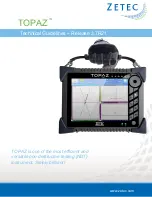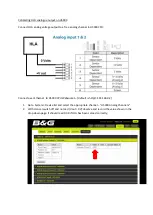
10
•
MN-35947
•
Rev 15
•
01/18
•
Combitherm® CT PROformance™ and CT Classic Series Installation Manual
Installation Duties and Responsibilities
Designer/Consultant responsibilities: Pre-Install
Complete water analysis to be conducted to ensure water quality meets manufacture specifications.
Record the GPM rate from main water line from site that will be feeding the oven, using hose and bucket.
Proper floor drain within 3' (914mm), not directly underneath, of where the appliance is to be installed.
Two (2) cold water inlets - drinking quality. Both inlets can be from same source; must meet line pressure and flow rate specifications
for both inlets. Divide using a manifold. Run one side through treatment device before running to oven. A shut-off valve must be
installed ahead of inlets.
One (2) treated water inlet: 3/4" NPT connection. Line pressure 30 psi minimum dynamic and 90 psi maximum static (200 to 600 kPa)
at a minimum flow rate of 0.26 gpm (1 L/min) for 6-10, 10-10 and 7-20 models, 0.53 gpm (2 L/min) for 10-20 models, and 0.80 gpm (3 L/
min) for 20-10 and 20-20 models.
One (1) untreated water inlet: 3/4" NPT connection. Line pressure 30 psi minimum dynamic and 90 psi maximum static (200 to 600
kPa) at a minimum flow rate of 2.64 gpm (10 L/min) for all models.
Gas appliances require one 3/4" line within 3' (914mm) of the appliance equipped with a manual shut off , and ready to be hooked to a
quick disconnect hose.
Proper vent hood is installed, and possible interconnection with gas supply per by local code.
Proper electrical voltage, phase, wire size, breaker size, and disconnects are provided for hook ups within 3' (914mm) of the appliance.
Exhaust air for gas appliances, exhaust hood, ventilation ceiling, chimney, spacing from top edge of appliance to lower edge of grease
filters/ceiling.
If floor is to be sloped then level surface must be provided for trolley/cart appliances.
Confirm clearances of hallways, and doors to the installation area are suff icient for the model of the appliance being installed.
installer responsibilities: Pre-Install
Pre-Installation check sheet has been properly filled out.
installer responsibilities: Install
Inspect, receive, deliver, uncrate, set appliance in place, and check that appliance is level.
Make water connections. Make sure treated and untreated water lines are hooked up properly to the correct fittings.
Hook up final electrical, check for proper voltage, phase, wire size, and breaker size. Ground fault or residual current protection device
must accommodate a leakage current of 20mA. Report any issues to the designer / consultant.
Plumb in the appliance steam resistant drain per manufactures required specifications as found in the installation manual.
Ensure gas pressure is above minimum and below maximum pressures listed in the installation manual for the corresponding gas type.
Check that all accessories are unpackaged and set up for the end user.
Ensure Combi appliance is properly fastened to the ground, or has a restraint installed if on casters.
Ensure most current soft ware is installed / uploaded.
Verify installation meets the manufacture specifications per the installation manual.
Test that the Combi appliance is fully operational, report any issues or manufacturing defects.
Pick up any packaging trash and debris from the installation.
Clean and wipe down the outside of the appliance and make presentable to the end user.
Take pictures of the installation verifying proper drain, water lines, and clearances are met.
aSa responsibilities: Aft er Install
Perform mechanical startup.
Complete post installation check sheet.
Pictures of the install’s electrical connections, water, drain, and clearances should be taken and sent to:
rSP/Dealer: Aft er Install
Confirm installation is correct.
Provide operational training and demonstration, and contact information for post installation support.
Verify warranty registration documentation has been submitted.
Customer/end user
Complete and submit warranty registration documentation.
Use the appliance only for its intended purpose.
Follow cleaning and planned maintenance schedules to maximize the life of the equipment.
Retro Fit/Existing Kitchen











































